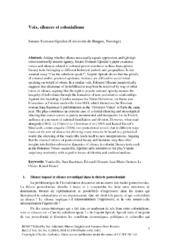| dc.contributor.author | Gjerden, Jorunn Svensen | |
| dc.date.accessioned | 2020-03-23T13:20:44Z | |
| dc.date.available | 2020-03-23T13:20:44Z | |
| dc.date.issued | 2019-11-11 | |
| dc.Published | Gjerden, J. Voix, silences et colonialisme. Bergen Language and Linguistics Studies (BeLLS). 2019;10(1) | eng |
| dc.identifier.issn | 1892-2449 | |
| dc.identifier.uri | https://hdl.handle.net/1956/21570 | |
| dc.description.abstract | Asking whether silence necessarily equals oppression, and (giving) voice necessarily assures agency, Jorunn Svensen Gjerden’s paper examines voices and silences related to colonial power structures in three francophone literary texts belonging to different historical periods and geographies. In her seminal essay “Can the subaltern speak?”, Gayatri Spivak shows that the pitfalls of colonial and/or gendered epistemic violence are difficult to avoid when speaking on behalf of others. In a similar vein, Édouard Glissant paradoxically suggests that dilemmas of invisibilisation may best be resolved by way of other forms of silence, arguing that the right to psycho-cultural opacity ensures the integrity of individuals through the formation of non-assimilative relationships. Against this backdrop, Gjerden analyses La Vénus Hottentote, ou Haine aux Françaises, a Parisian vaudeville from 1814, which thematises the Khoisan woman Sara Baartman’s performances as the ‘Hottentot Venus’ in Paris the same year. The play constitutes an extreme case of colonial silencing and stereotypical othering that comes across as purely instrumental and therapeutic for its French audience at a moment of national humiliation and division. However, when read alongside J.M.G. Le Clézio’s Le Chercheur d’or (1985) and Kamel Daoud’s Meursault, contre-enquête (2014), two postcolonial novels that in different ways focus on the role of silence for allowing every voice to be heard in a globalised world, the silencing of the vaudeville lends itself to new interpretations. Arguing that the claimed silence of postcolonial theory and literature may thus offer insights into hidden subversive dynamics of silence in colonial literary texts such as the Hottentot Venus vaudeville, Gjerden calls attention to the play’s latent surprising modernity with regard to issues of identity and multiculturalism. | en_US |
| dc.publisher | University of Bergen | eng |
| dc.rights | Attribution CC BY | eng |
| dc.rights.uri | http://creativecommons.org/licenses/by/4.0/ | eng |
| dc.subject | Vaudeville | eng |
| dc.subject | Sara Baartman | eng |
| dc.subject | Édouard Glissant | eng |
| dc.subject | Jean-Marie Gustave Le Clézio | eng |
| dc.subject | Kamel Daoud | eng |
| dc.title | Voix, silences et colonialisme | eng |
| dc.type | Peer reviewed | |
| dc.type | Journal article | |
| dc.date.updated | 2020-01-20T06:36:56Z | |
| dc.description.version | publishedVersion | |
| dc.rights.holder | Copyright 2019 The Author(s) | eng |
| dc.identifier.doi | https://doi.org/10.15845/bells.v10i1.1462 | |
| dc.identifier.cristin | 1757824 | |
| dc.source.journal | Bergen Language and Linguistics Studies (BeLLS) | |

